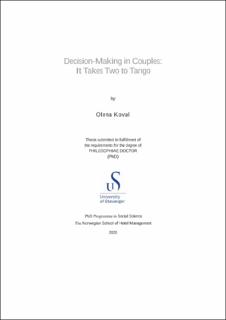Decision-Making in Couples: It Takes Two to Tango
Doctoral thesis
Permanent lenke
https://hdl.handle.net/11250/2684182Utgivelsesdato
2020-10Metadata
Vis full innførselSamlinger
- PhD theses (SV-NHS) [17]
Originalversjon
Decision-Making in Couples: It Takes Two to Tango by Olena Koval, Stavanger : University of Stavanger, 2020 (PhD thesis UiS, no. 550)Sammendrag
The main aim of this thesis is to gain a better understanding of collaborative decision-making in primary groups (couples) when approaching complex choice situations. To understand how decisions in couples are made, many variables have been studied. Most of these variables are related to the general model of family decision-making, consisting of couples’ demographic characteristics, family life cycle, and influence/gender role attitudes. However, existing theory on decisionmaking cannot grasp all the complexity of choice processes modern couples make. More women at work, different couple structure, and circumstances under which couples take decisions (increased range of choice, for example) indicate that more extended decision-making theory is needed. Because the theories of “power” and “roles” were developed in the context of traditional couples, they may not apply to cohabiting couples these days. Thus, I suggest that in order to gain a broader understanding of complex decisions made in couples, we would benefit from the entire approach to the investigation being revised.
Firstly, variables related to the interpersonal ties investigated in previous research have shown to be beneficial to group performance. Thus, it would be beneficial to move from studying already well-explored demographic variables to investigating the role of interpersonal factors. Secondly, studies on shared/joint decision-making in other research areas and among more secondary types of groups indicate that collaboration in complex choice situations is vital for taking “good” decisions. Thus far, collaborative decision-making in primary groups, such as consumer couples is in its early stage of investigation.
Consequently, three research aims address the lack of current knowledge in the area of couples’ decision-making. Study 1 aims to gain an understanding of how couples work in situations where a decision is made together and not being delegated to one of the partners. My goal here is to identify which interpersonal factors within a couple guide decision-making in complex choice situations. Study 2 aims to empirically test the conceptual model developed in Study 1 on a wider population. To gain a better insight on how interpersonal factors shape decision-making in close relationships, I aim to test whether shared experiences, flexibility, engagement, role exchange, and partner’s support, identified in Study 1, affect the perception of decision-making collaboration among partners. The results of the survey in Study 2 indicate that all factors, but one (role exchange), positively affect partner’s perception of collaboration when making decisions. Study 2 also shows that during complex choice situations collaboration is a central driver of decision process satisfaction.
The goal of my third study is to investigate whether individuals, couples and random groups differ when making decisions, and to explore the performance of couples on the same task, but under time pressure. This study builds on the two former studies of my thesis. The results demonstrate that couples perform better than their partners do individually, however groups consisting of members who do not have this kind of close relationship do not show the same results in problem solving performance. Consequently, my findings suggest that couples as a decision-making unit benefit from their shared experiences, and therefore outperform both random groups and individuals when task specific knowledge is held constant.
Beskrivelse
PhD thesis in Hotel and tourism management
Består av
Paper 1: Koval, O., & Hansen, H. (2019). Working it out together: a suggested model for vacation-related decision-making in couples. Scandinavian Journal of Hospitality and Tourism, 19(4-5), 354-370. This paper is not in Brage for copyright reasons.Paper 2: Koval, O., & Hansen, H. (2019). It takes two to tango: Antecedents to collaborative decision-making in couples. Manuscript submitted for publication. This paper is not in Brage for copyright reasons.
Paper 3: Koval, O., & Hansen, H. (2020). Ill-structured, but structurable decision problems: The performance of couples versus individuals and random groups. Manuscript submitted for publication. This paper is not in Brage for copyright reasons.
Utgiver
University of Stavanger, NorwaySerie
PhD thesis UiS;;550

